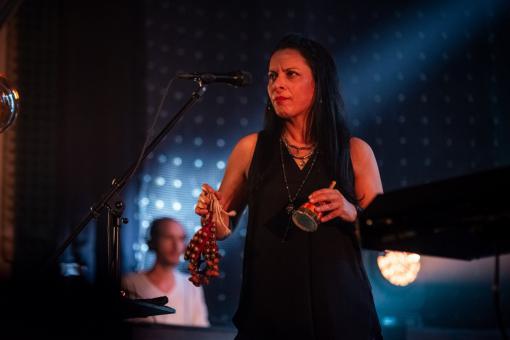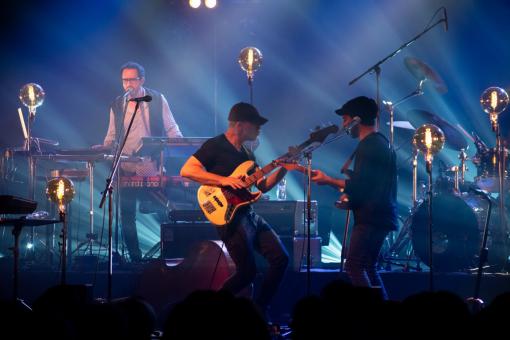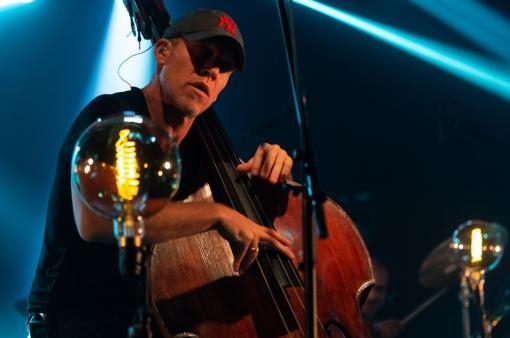“Up until now, I recorded instrumental songs – with a few exceptions but most of them were instrumental. This is truly the first album where I sing 100% of the songs from beginning to end, which is a big change for me. I needed to make such a step, so I had a bit of fun and I recorded a vocal album,” Avishai Cohen, the Israeli bass player told me a few months ago over the phone. We were talking of course about his current album 1970, where he includes his own songs inspired by the popular music of the seventies, Eddie Palmieri’s classic Vamos Pa’l Monte, the American gospel Motherless Child or folk songs from the Middle East. The album 1970 in its context leans toward pop maybe as an exception, but also references the bass player’s personal history and his love of jazz and traditional Jewish music. The current tour, which included the concert in the Boby Centre in Brno as part of JazzFestBrno, corresponds with the album’s topic, and yet differs a bit. It is even more pop and can surprise even experienced listeners.
Avishai Cohen has performed in Brno as part of JazzFest four times. He played once in the theatre, three times in the Boby Centre. For the first and second appearances he performed with his classic jazz repertoire, the trio that he continues to give concerts with (for example last year in the autumn in Prague). For the third time, the bass player performed together with the Brno Philharmonic, and this larger ensemble went well with his jazz repertoire. However, this time the only links to the preceding appearances were several brilliant bass solos. The rest was new, different, not really jazz. And the result? On the one hand, deserved applause, even a standing ovation from a large part of the audience, but on the other a few comments, among them “Of the four Cohen concerts, this was the worst”. It really depended on what one expected, and which Cohen they came for.

Unlike the album, which is arranged in part traditionally and acoustically (with the cello and Arabian lute), the concert version of the programme is based on the pop-rock ensemble: keyboards (Shai Bachar), guitar (Marc Kakon), drums (Noam David) and bass (alternating between the double bass and bass guitar; Avishai Cohen) plus Cohen’s singing and also the very important Karin Malka, Cohen’s amazing court vocalist for the past few years. The Middle Eastern elements are visible only in the method of singing and in the Hebrew texts of some of the songs, otherwise one could deduce the artists’ origins only in the slightly chaotic introductory passage, which marked the beginning of the following wild ride among the different genres. From the first song, the drums were one of the most important instruments, together with the light play, which – in some places almost aggressively – warned that this really wouldn’t be acoustic jazz. Already the second song with the bass guitar used the rhythms of funk and reggae, creating a bridge to one of the big hits of the album, It’s Been So Long. This was introduced by Cohen with a rock-style intro on the bass, while the following song with the double bass used a disco rhythm reminiscent of the end of the seventies, distorted vocals (the domain of keyboard player Bachar) and green lighting.
Another significant moment in the concert was the aforementioned traditional Motherless Child, one of the best performances by the singer Karen, who showed us that she is a brilliant soul vocalist. Cohen, this time playing the keyboard, joined in with the singing to turn the classical song into a proper rock hit. In the following song, we got to see a bit of hip hop and then what was maybe the strongest song on the album - Song Of Hope. What on the album was a pleasant mix of jazz and pop was a rock hit at the concert, with pronounced drums and the frontman once again at the keyboard.

The concert finale consisted of long solos on the drums and the double bass as part of Palmieri’s swinging song Vamos Pa’l Monte. Its concert version was of course different from the acoustic one on the album, but the important thing was that the packed Boby Centre turned (at least partially) into a dance floor. Before the final added song – another round of distorted vocals and pop sound – Avishai Cohen showed himself once again as a solo bass player in an instrumental song, to remind us that he hasn’t forgotten his musical roots.
In his fourth performance in Brno, Cohen gave us a brilliant pop show with all that is needed – a brilliant (not only) accompanying singer, amazing musicians and light play. He communicated moderately with the audience, since the energy emanating from the podium said it all. But while for example Donny McCaslin a month earlier melded jazz with rock and pop organically in his performance, Cohen separates the two genres. He is an excellent jazz musician, and (as we now know) a good pop showman, but he doesn’t have the need to connect these two worlds. In the aforementioned interview (which was published in Harmonie magazine), he told me: “When I release an album like 1970, it does not mean I want to focus only on it in the future. It is just one of the platforms that characterise me as an author.” Let’s see what he gives us next. I am sure that we haven’t seen the last of Cohen, and that he hasn’t shown all he can do here at JazzFest. For example, something like his former project Almah with the cor anglais, oboe, viol and violin would be very amusing for me.
Avishai Cohen “1970”. Boby Centre Brno, 5/4/2018, as part of the JAZZFESTBRNO festival
































No comment added yet..